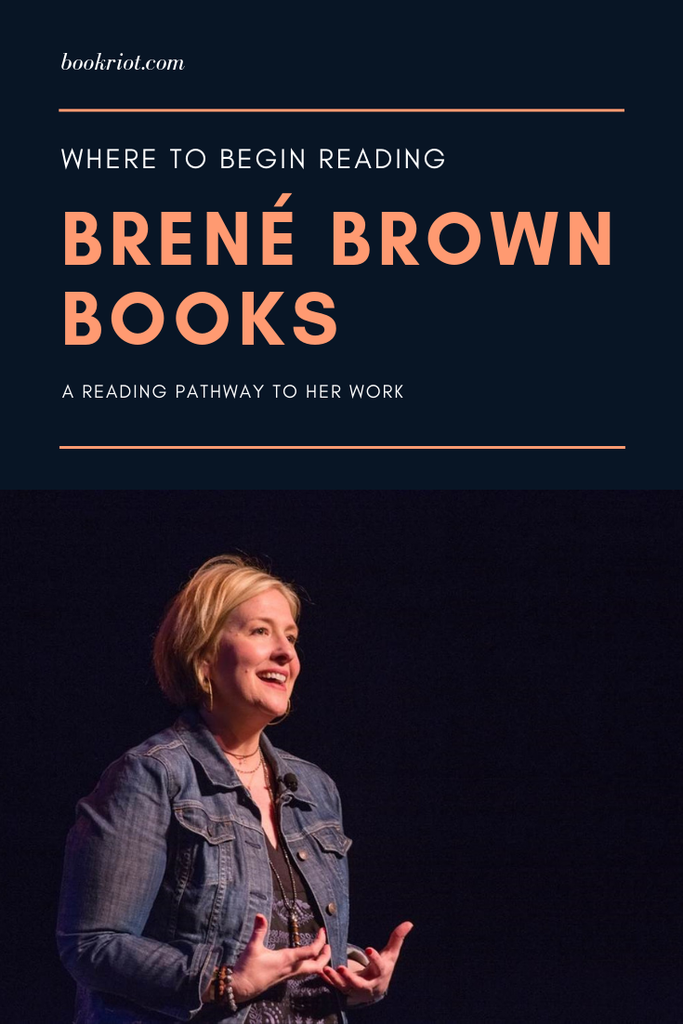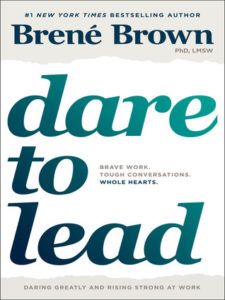Brené Brown takes on not only vulnerability, but she also digs deep into the experiences of shame and how both shame and vulnerability connect us to and push us away from the relationships in our lives. These same topics weave neatly across other areas of interest and experience—Brown’s most recent book, which will be discussed below, takes shame and vulnerability and applies them to what it means to be a powerful, compassionate, and effective leader. I’ve always been someone who struggles with my feelings. I live in my head and pride myself on being a logical, thought-based person. But in recent years, particularly as I’ve really begun living into my yoga practice beyond the physical practice, I’ve come to better understand that having feelings is a super important, vital human experience. I found myself thinking about why I denied those feelings for many years, and then thinking about those feelings and why I was having them more than simply feeling them. Part of this is bound up in having mental illness, but part of it is also because we simply don’t talk about what feelings are or what they feel like. It was through reading more of Brown’s books, though, that I’ve been working through the shame and vulnerability there is in expressing feelings and understanding them as such, before trying to process them as emotions and thoughts. I didn’t realize this was an experience so common to other people, and it’s thanks to these books that I’m finding myself on a powerful path of understanding myself—as well as other people. Here’s where to get started with the empowering, moving, and necessary Brené Brown books.
Where To Begin Reading Brené Brown Books
I Thought It Was Just Me (But It Isn’t): Making The Journey From “What Will People Think?” to “I Am Enough”
Though this was one of the last Brené Brown books I read personally, I think it’s a really great place to start because it really lays out what her research is and why it matters. This book digs into the standards we all hold ourselves too as they relate to perfectionism and the fears we all carry about never being good enough. These standards for perfection lead us to overlooking the need to be vulnerable and the need to explore the shame that exists in our fears of being inadequate. By being vulnerable, we’re able to better connect with one another on a very human level; by chasing the imaginary ideals of perfection, we disconnect with one another. Brown interviewed hundreds of people, talking about where they see themselves setting up these standards and why it is they blame themselves for various situations in their lives. She then shares those stories and explains how they expose our inabilities to process shame for what it is and our fears of being vulnerable and really connecting with other people. This is an especially great read for the perfectionism, Type A folks out there who know they need to let go of some of that control. I found myself nodding my head a lot, connecting with some of the stories shared and realizing that it was not just me. I listened to this one on audio, as I tend to do with Brené Brown books. Although she performs the following titles—which is why I enjoy listening to them, since hearing it in her own voice helps me connect to the content—this one is performed by Lauren Fortgang, who does a good job.
Daring Greatly: How The Courage To Be Vulnerable Transforms The Way We Live, Love, Parent, and Lead
For many who discover Brown’s work, this is the first title they connect with and/or they find to be a favorite. I personally found Rising Strong to be more relevant in my life than this one, but in order to really connect with that title, I needed to read Daring Greatly first. Building upon the work in I Thought It Was Just Me, this title digs really far into what it means to be vulnerable and why being vulnerable is how we’re able to open ourselves up to new experiences and deeper, more meaningful relationships. This book goes beyond our internal experiences and applies the concepts related to vulnerability across a wide spectrum of situations. There is discussion of why vulnerability is important in parenting, in relationships (romantic, platonic, or otherwise), and even in the work place. But more than explaining what vulnerability is and how it works, this book encourages readers to be courageous in living in that vulnerability by getting rid of the need to be perfect and instead, be willing to make mistakes, to open up, and to reach out. Brown gets courageous herself in this title, digging into her own personal biases around things like gender, particularly as it relates to expressing and experiencing shame and vulnerability and how over a decade of research disproved her own theories and helped her forge a better understanding of how universal these experiences are.
Dare To Lead: Brave Work. Tough Conversations. Whole Hearts.
Why is it that we’ve been told and conditioned to leave our feelings and our personal lives at the door when we go to work and into our careers? That’s one of the big questions this title attempts to answer, while also providing actionable steps for how to really encourage vulnerability when it comes to work and more specifically, in being a great leader in your life, your relationships, and your affiliations. The key in this book is being curious and empathetic, which are both often things that are overlooked in leadership. It’s not about how much you do; it’s about the way in which you do the things you do. Brown’s big mantra throughout the book is “people, people, people.” Everyone has a story and everyone’s minds make up stories to help them get through the day. When we remember this simple thing, it becomes easier to be a leader and to be an advocate for what it is you want, what you need, and where you fit into the grander scheme of your life. Because this book isn’t about leadership in organizations only; sure that’s there. But it’s a book about being a leader in your life and showing up, day after day, for yourself. Where I Thought It Was Just Me begins the internal work and Daring Greatly asks for that internal work to manifest outwardly, Dare To Lead is very much about shining those inward thoughts and experiences into tools for being an effective leader.
This video does an excellent job of highlighting one of the things that most resonated with me from Brown’s work: the difference between empathy (connecting with) and sympathy (distancing from). Want more? You’ll want to dig into these powerful Brené Brown Quotes.



